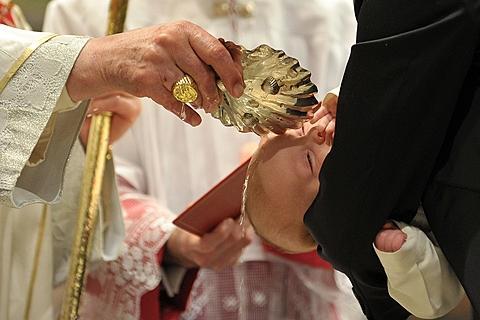Voluntary 'De-Baptism' Rising in Europe
By Lisa Bryant
Sunday evening youth mass in Saint-Germain-des-Pres is overflowing with parishioners. People stand in aisles or sit cross-legged in corners of the cavernous, sixth century Paris church. Father Benoist de Sinety, parish priest at Saint Germain for the past three years, says he has always had the good fortune of seeing crowds of young people seeking their bearings or rediscovering faith. But he knows it is not the same everywhere. Churches in France and elsewhere in Europe have been battling falling numbers, a trend evident not only in the empty pews, but in the sharp fall in baptisms. But "de-baptisms", a church's deletion of one's name from the official baptismal registry at a parishioner's request, are a recent phenomenon, and they are taking place in both Protestant and Catholic communities. There are no official statistics, but experts and activists count the numbers of those seeking de-baptism in the tens of thousands, and websites offering informal "de-baptism" certificates have mushroomed. Anne Morelli, who heads a center for religion and secularity studies at the Free University of Brussels, says de-baptisms, both official and unofficial, increased in 2011, particularly in the Netherlands, Germany, Belgium and Austria. The numbers, she said, reflect public anger at the church pedophilia scandals. Terry Sanderson, head of the National Secular Society in Britain, agrees. "I think what sparked the real desire of people to leave the church, particularly the Catholic church, were the huge child-abuse scandals that revolted so many people [that] they no longer wanted to be associated with it," he said. "That's when people started to leave in large numbers." A decade ago, Sanderson's society posted an unofficial "de-baptism certificate" on its website, which has been downloaded more than 100,000 times to date. "It was a joke to begin with, but now it has taken on a new significance because there are so many people who are anxious to leave the church that they are actually taking it seriously now, and they want some way to make their break with the church formal," he says. "Often the church won't acknowledge their desire to leave." But Christian Weisner, a spokesman for the international grassroots We Are Church movement, points not only to a range of issues that have resulted in de-baptism, but a range methods by which people choose to sever ties to the church. In Germany, where a record 181,000 Catholics formally split from the church in 2011, some terminated their relations by legally opting out of paying state church taxes. For the first time, he says, more German Catholics cut ties to their church last year than Protestants. "They are thinking about leaving the church and there might be one special event, like the pedophilia crisis, like a [conservative] announcement by the pope, and then they decide now is the time to go," says Weisner, referring to the fact that some Catholics oppose Pope Benedict's stances on issues like abortion, homosexuality and married priests. In France, 71-year-old Rene Lebouvier decided it was time to go a decade ago. After requesting to have his name crossed off his church's baptismal registry, he ultimately filed a lawsuit to have it legally deleted. In October, a lower court in Normandy ruled in his favor, but a local bishop is appealing the verdict. According to religion professor Philippe Portier of the National Center for Scientific Research in Paris, Lebouvier's case could set a legal precedent in a country where few seek to be de-baptized. "It will be the first time in Europe, and especially in France, that the church will be obliged to delete from its registers the name of churchgoers who do not want to be considered as church goers," he says. While Portier doubts the appeals court will rule in Lebouvier's favor, France's Catholic Church will not comment on the court case. Bernard Podvin, spokesman for the French Bishops Confederation, says the church views de-baptisms with vigilance and willingness for dialogue, but that the phenomenon should not be exaggerated. Church figures indicate that numbers of baptisms are plummeting, with only about one in three French children baptized compared to 90 percent half a century ago. Portier says the church has been proactive in addressing the issue, putting in place a new evangelizing strategy to encourage families to baptize their children. At Saint-Germain-des-Pres, the effort appears to be working. The church offers many activities, from ski outings to professional support networks, in order to draw in young Catholics. Aware of dwindling baptisms, Father Benoist says there may be fewer Christians today, but those who remain also understand their mission more strongly -- to be of service to man and God and to love.
|
.
Any original material on these pages is copyright © BishopAccountability.org 2004. Reproduce freely with attribution.
